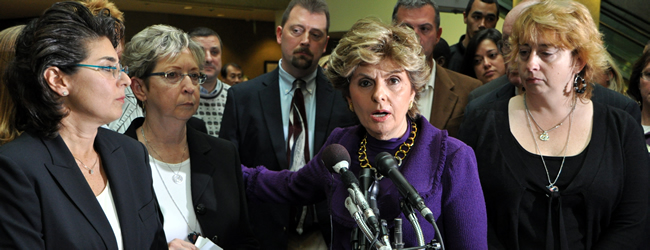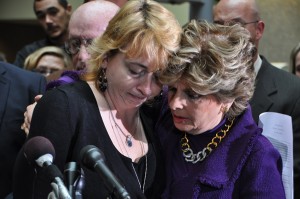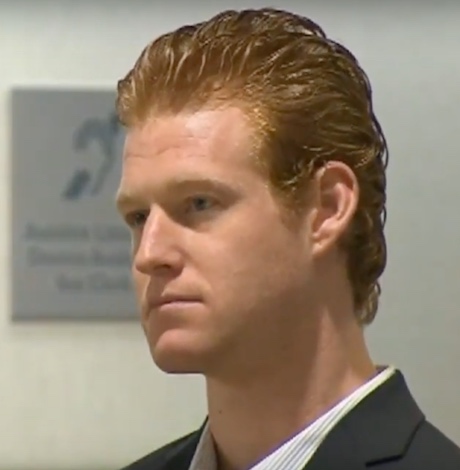Local
Family calls for hate crime probe in Betts murder case
One defendant sentenced to 40 years; another pleads guilty


Jennifer Altomare, sister of murder victim Brian Betts, with attorney Gloria Allred. (Blade photo by Michael Key)
Speaking through an attorney known for taking on high-profile celebrity cases, the family of gay D.C. middle school principal Brian Betts Tuesday called on the U.S. Justice Department to investigate whether Betts’ murder in April was motivated by anti-gay bias.
Los Angeles attorney Gloria Allred, who has been retained by Betts’ parents, discussed the possible hate crime angle to the case during a news conference at a courthouse in Rockville, Md., minutes after a judge sentenced defendant Alante Saunders, 19, to 40 years in jail for Betts’ murder.
Betts was found shot to death April 15 in the second floor bedroom of his Silver Spring, Md., house. Saunders and three other teenage males were charged with murder in connection with the case a short time later.
Authorities said Saunders met Betts through a sex chat line and hatched a plan with the other three youths to commit a robbery. Defense attorneys and prosecutors said the youths did not intend to kill Betts and attributed the shooting to a “robbery that went bad.”
Police identified Saunders as the shooter.
“Brian’s family retained me to represent them as victims in the criminal case,” said Allred, who has hosted a radio talk show specializing in legal issues.
“The family has also retained me to explore whether or not Brian’s murder should also be prosecuted under the new Matthew Shepard federal hate crimes law,” she said.
“Brian was a gay man and we believe an investigation should be opened under that law to determine whether a hate crime has or has not been committed by defendant Saunders and if it has whether it is appropriate to proceed with a federal prosecution under that law.”
Police and prosecutors said an investigation found that Saunders and Betts met through a sex chat line and that Betts invited Saunders, who expressed an interest in seeing him, to his house. Sources familiar with the case have said the chat line caters to gay men seeking other men for sex, but authorities have declined to identify the chat line by name.
Saunders pleaded guilty last month to first-degree felony murder in connection with the case. As part of a plea bargain arrangement, prosecutors agreed to ask Montgomery County District Court Judge John Debelius to sentence Saunders to life in prison with all but 40 years suspended.
Debelius agreed to the request at a sentencing hearing Tuesday following emotional statements delivered by nine family members and friends of Betts, including Betts’ mother, Doris Betts, his father, Delbert Betts, and sister, Jennifer Altomare. Nearly all of them wept as they described Betts, 42, as an extraordinary educator, mentor, loyal family member and friend.
“When I received word that our son had been killed in his own home, my world crumpled around me,” said Doris Betts. “These were supposed to be the golden years for me, but instead they will be the saddest years of my life.”
The judge also agreed to a request by defense attorney David Felsen that he recommend that Saunders be placed in a special state correctional facility that provides vocational training.
Debelius noted that under Maryland law, Saunders is eligible to apply for parole after serving 20 years.
Earlier in the day on Tuesday, the second of the three other men charged in Betts’ murder, Sharif Lancaster, 19, pleaded guilty to robbery and use of a handgun during commission of a felony as part of a plea bargain offered by prosecutors. Prosecutors agreed to drop an initial charge of first-degree felony murder against Lancaster.
He is scheduled to be sentenced Feb. 11 and faces a possible maximum sentence of 35 years in prison.
The Montgomery County State’s Attorney’s office and defense attorneys have said discussions were underway to arrange plea bargains for the remaining two defendants, Joel Johnson, 19, and Deontra Gray, 18.
Montgomery County State’s Attorney John McCarthy told reporters at the courthouse that his office investigated the possibility that Betts’ murder was a hate crime and could not find evidence to substantiate a bias related motive to the case.
“If we had seen evidence of a hate crime, we would have charged it,” he said. “And we have an advantage. We’ve seen the evidence.”
Gay rights attorneys have said state and local prosecutors sometimes don’t recognize the nuances of evidence that others might interpret as bias related elements of cases involving gay victims. They note that the Matthew Shepard Hate Crimes Prevention Act gives federal prosecutors through the Justice Department authority to overrule local prosecutors and initiate a federal hate crimes charge if supported by a federal probe.
At her courthouse news conference Allred declined to disclose evidence she knows of to support a hate crime, saying it would be improper to discuss evidence until the cases of all of the four defendants are completed.
Some gay activists have speculated that a bias or hate related element might be present in the case if the defendants selected the chat line to specifically target a gay man for a crime.
McCarthy and other prosecutors with the Montgomery County State’s Attorney’s office have refused so far to disclose specific details about what Sanders said to Betts through the chat line and the events that led to his firing the gun he used to shoot Betts.
Maryland
Md. Commission on LGBTQIA+ Affairs released updated student recommendations
LGBTQ students report higher rates of bullying, suicide

The Maryland Commission on LGBTQIA+ Affairs has released updated recommendations on how the state’s schools can support LGBTQ students.
The updated 16-page document outlines eight “actionable recommendations” for Maryland schools, supplemented with data and links to additional resources. The recommendations are:
- Developing and passing a uniform statewide and comprehensive policy aimed at protecting “transgender, nonbinary, and gender expansive students” against discrimination. The recommendation lists minimum requirements for the policy to address: name, pronoun usage, and restroom access.
- Requiring all educators to receive training about the specific needs of LGBTQ students, by trained facilitators. The training’s “core competencies” include instruction on terminology, data, and support for students.
- Implementing LGBTQ-inclusive curricula and preventing book bans. The report highlights a “comprehensive sexual education curriculum” as specifically important in the overall education curriculum. It also states the curriculum will “provide all students with life-saving information about how to protect themselves and others in sexual and romantic situations.”
- Establishing Gender Sexuality Alliances “at all schools and in all grade levels.” This recommendation includes measures on how to adequately establish effective GSAs, such as campaign advertising, and official state resources that outline how to establish and maintain a GSA.
- Providing resources to students’ family members and supporters. This recommendation proposes partnering with local education agencies to provide “culturally responsive, LGBTQIA+ affirming family engagement initiatives.”
- Collecting statewide data on LGBTQ youth. The data on Maryland’s LGBTQ youth population is sparse and non-exhaustive, and this recommendation seeks to collect information to inform policy and programming across the state for LGBTQ youth.
- Hiring a full-time team at the Maryland Department of Education that focuses on LGBTQ student achievement. These employees would have specific duties that include “advising on local and state, and federal policy” as well as developing the LGBTQ curriculum, and organizing the data and family resources.
- Promoting and ensuring awareness of the 2024 guidelines to support LGBTQ students.
The commission has 21 members, with elections every year, and open volunteer positions. It was created in 2021 and amended in 2023 to add more members.
The Governor’s Office of Communication says the commission’s goal is “to serve LGBTQIA+ Marylanders by galvanizing community voices, researching and addressing challenges, and advocating for policies to advance equity and inclusion.”
The commission is tasked with coming up with yearly recommendations. This year’s aim “to ensure that every child can learn in a safe, inclusive, and supportive environment.”
The Human Rights Campaign’s most recent report on LGBTQ youth revealed that 46.1 percent of LGBTQ youth felt unsafe in some school settings. Those numbers are higher for transgender students, with 54.9 percent of them saying they feel unsafe in school.
Maryland’s High School Youth Risk Behavior Survey reveals a disparity in mental health issues and concerns among students who identify as LGBTQ, compared to those who are heterosexual. LGBTQ students report higher rates of bullying, feelings of hopelessness, and suicidal thoughts. Nearly 36 percent of LGBTQ students report they have a suicide plan, and 26.7 percent of respondents say they have attempted to die by suicide.
The commission’s recommendations seek to combat the mental health crisis among the state’s LGBTQ students. They are also a call for local and state governments to work towards implementing them.
Virginia
Va. lawmakers consider partial restoration of Ryan White funds
State Department of Health in 2025 cut $20 million from Part B program

The Virginia General Assembly is considering the partial restoration of HIV funding that the state’s Department of Health cut last year.
The Department of Health in 2025 cut $20 million — or 67 percent of total funding — from the Ryan White Part B program.
The funding cuts started with the Trump-Vance administration passing budget cuts to federal HIV screening and protection programs. Rebate issues between the Virginia Department of Health and the company that provides HIV medications began.
Advocates say the funding cuts have disproportionately impacted lower-income people.
The Ryan White HIV/AIDS Program, a federal program started in 1990, provides medical services, public education, and essential services. Part B offers 21 services, seven of which remained funded after the budget cuts.
Equality Virginia notes “in 2025, a 67 percent reduction severely destabilized HIV services across the commonwealth.”
Virginia lawmakers have approved two bills — House Bill 30 and Senate Bill 30 — that would partially restore the funding. The Ryan White cuts remain a concern among community members.
Both chambers of the General Assembly must review their proposed changes before lawmakers can adopt the bills.
“While these amendments aren’t a full restoration of what community-based organizations lost, this marks a critical step toward stabilizing care for thousands of Virginians living with HIV,” said Equality Virginia Executive Director Narissa Rahaman. “Equality Virginia plans to continue their contact with lawmakers and delegates through the conference and up until the passing of the budget.”
“We appreciate lawmakers from both sides of the aisle who recognized the urgency of this moment and will work to ensure funding remains in the final version signed by the governor,” added Rahaman.
District of Columbia
D.C. Black Pride theme, performers announced at ‘Speakeasy’
Durand Bernarr to headline 2026 programming

The Center for Black Equity held its 2026 DC Black Pride Theme Reveal event at Union Stage on Monday. The evening, a “Speakeasy Happy Hour,” was hosted by Anthony Oakes and featured performances by Lolita Leopard and Keith Angelo. The Center for Black Equity organizes DC Black Pride.
Kenya Hutton, Center for Black Equity president and CEO, spoke following the performances by Leopard and Angelo. Hutton announced this year’s theme for DC Black Pride: “New Black Renaissance.”
Performers for 2026 DC Black Pride were announced to be Bang Garcon, Be Steadwell, Jay Columbus, Bennu Byrd, Rue Pratt and Akeem Woods.
Singer-songwriter Durand Bernarr was announced as the headliner for the 2026 festivities. Bernerr gave brief remarks through a video played on the screen at the stage.
DC Black Pride is scheduled for May 22-25. For more information on DC Black Pride, visit dcblackpride.org.



















